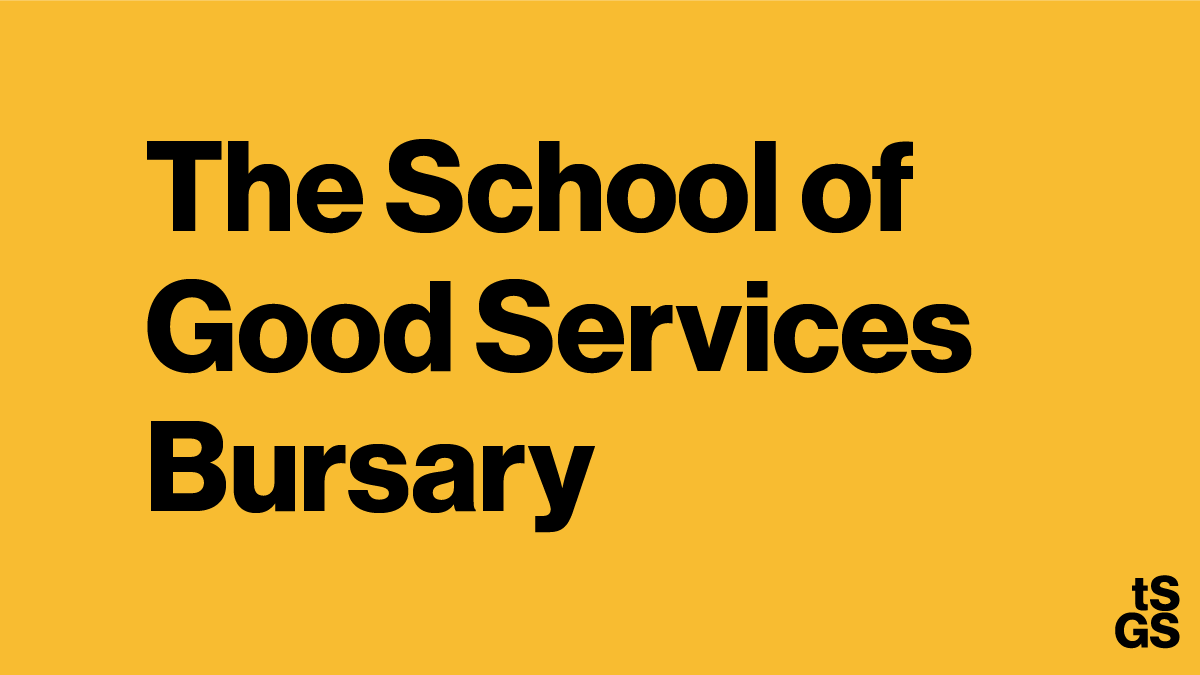Announcing our five free bursaries
We’ve opened a School of Good Services Bursary which gives 5 people an opportunity to attend a course for free at the school and have 1:1 coaching with our directors on a twice yearly basis.
If you want to understand more about why we’re doing it though, here’s why:
Last week, the UK Government made an announcement stating that it was ‘cracking down’ on ‘low-value university degrees’*. Their working definition of a low-value university degree is where a low proportion of graduates get a ‘professional’ job, go into postgraduate study or start a business.
We know that this is going to disproportionately affect the creative industries, particularly the arts, culture and design sectors. Where universities are cash strapped, it is likely they will start cutting creative courses*.
Both Lou and I have what might be considered now as a ‘low value degree’. Graduating at the height of the financial crisis, it wasn’t easy to get a job, particularly a job in the creative industries. Lou went into an unpaid internship in the culture sector and I co-founded Snook in a sort of ‘invent your own job’ way.
Getting through university wasn’t an easy ride. My Government loan didn’t cover living costs, never mind studio fees and material costs, and without parental financial support I had to work a lot during my full-time degree to cover living costs. But this was in Scotland, where my fees were free, and before student fees across the rest of the UK took an astronomical hike in recent years. The situation facing many graduates now is a lot harder.
Before I go any further, I should say: I’m a big believer in university and college experiences. It should be a time of reduced pressure for exploration and critical thought alongside developing the skills and experience that will help people move into some form of work or further study.
But even getting there in the first place isn’t easy for everyone.
We know there are countless barriers to accessing university education*
Access to this system is a privilege that not all of us are afforded. We know that graduates from disadvantaged backgrounds, those who are mixed white and Black Caribbean, mature or disabled, are all more likely to drop out from further education and less likely to achieve graduate outcomes because of the discrimination they face in the graduate jobs market*.
So our first challenge is this. Creative degrees are at risk and not everyone has the privilege to access higher education or thrive within it. Frustratingly, many user centered design roles still ask for degrees as minimum entry criteria creating a barrier to industry entry and promotion into more senior roles.
Beyond access to education, we recognise that many individuals face systemic discrimination entering the design industry and are under represented.
Systemic Discrimination involves the procedures, routines and organisational culture of any organisation that, often without intent, contribute to less favourable outcomes for minority groups than for the majority of the population, from the organisation’s policies, programmes, employment, and services*.
We’ve had growing evidence for years that the design industry has a diversity and inclusion problem.
Recent research from the Design Council has shown us that 85.6 percent of managers in the UK Design Economy workforce are from a white background. Across the pond, 9,429 designers who filled out AIGA’s 2019 Design Survey, 71% of respondents were white, an overrepresentation in a country that’s only 60.4% white*. We know this is a problem and initiatives like Where are the black designers conference* and Black Design Guild* are highlighting and taking on this challenge.
In a 2021 Design Council study 77 per cent of UK designers were male*. This is a figure that hasn’t moved since 2016 and we don’t have a credible figure on trans or gender non conforming people. We know the impact an industry dominated by men has on the design of everyday things. It wasn’t until 2011 that the US started using a female crash-test dummy
Beyond design, the number of working-class people in the arts has already shrunk by half since the 1970s*.
Between Lou and I, we’ve spent a combined 35 years in the design industry and beyond the data above, we’d had some shared observations include;
All white male panels or speaker lineups at conferences mean that the narrative on inclusion never seems to move beyond ‘It's hard! But we should do it!’
Services that have been designed without considering LGBTQ+ needs or shaped by a dominant hetronormative model
An embedded colonial approach to design and adopted western ideologies creating extractive relationships with the people who use our services
Interview processes that are not favourable to those who have caring responsibilities
A disregard for climate change and its disproportionate impact on the global south
An ableist gaze on service, workplace and event design where disabled people have to often use service lifts, neurodiversity isn’t genuinely considered and accessibility is the first thing to be dropped from a project budget
Without diverse teams and diversity of thought, we end up with products and services that are not inclusive, not accessible and perpetuate systemic discrimination.
In our personal lives we volunteer on boards and work on projects that tackle systemic discrimination in topics we have lived experience of.
In the past we’ve done work promoting inclusive design like commissioning the design-community generated Inclusive Design Recruitment guidelines. We’ve ensured in our writing to include principles around inclusion and accessibility. We always ensure to mention the climate (a user that can’t talk and is often underrepresented!) in our training.
When it comes to inclusion and underrepresentation, we will always be educating ourselves and will continue to critique our own work, past and present but we could and should be doing more.
There’s not one thing that will tackle the inclusion and diversity problem in design. It’s a deep, entrenched, complex systemic issue that has continued to swell over time. But we believe if we all did one thing, we’d be a lot further on than we are as an industry. So we sat down and thought, in our current business, what can we do now?
How the School of Good Services Services Bursary works
The Bursary will provide an opportunity for people who face systemic discrimination or are underrepresented in design, to come on 1 of our public courses for free and get some 1:1 coaching sessions with myself or Lou (or both of us). It applies to ALL courses no matter the length of them.
(Edit 2024): We now run the bursary once a year but have increased the amount of people we select.
We aim to launch it in the first few months of each year in time for the summer courses.
This bursary is for people who face systemic discrimination or are under represented. This may be people who have lived experience of or are;
Queer, Trans or non binary identifying
Black or a person of colour
Disabled or neurodiverse
Worried about financially meeting basic needs and inhibited in pursuing further education
First hand experience with the asylum seeking process
Affected disproportionately by climate change
Single parents
Under 21 and looking for their first step into design
It would be impossible for us to list every person who faces a form of systemic discrimination and it’s not as binary as categorising people into boxes, equally it’s not our place to judge anyone else’s struggles, but if you think you could be supported by the bursary, please do apply.
We don’t require a full on application. We just want you to tell us why you want to apply for the Good Services bursary and where you are at right now.
(Edit 2024:) In 2023 we chose 5 people for our first cohort and reviewed the process at the end of the year to tweak it. In 2024 we accepted more than three times this amount.
We have a range of public courses that our bursarys are applicable for.
Our contribution through the bursary to tackling diversity in design is small but we hope in some way we can support people who may be underrepresented in the design industry or facing systemic discrimination.
Read more about the bursary and apply
Other course discounts
We’ve also made it clearer who can apply for discounted tickets and how they can apply.
It’s not just individuals who are struggling right now. If your organisation is volunteer led or facing financial difficulty we offer a 25% discount on all public courses.
If you are a student, under 21, facing financial challenges or systematic discrimination that is affecting your ability to get into or progress into the design industry, we offer a 25% discount on all public course tickets.
* Notes
Rishi Sunak discusses Low value Degrees
Guardian reports on fears universities will cut creative arts and humanities courses
Equality of access and outcomes in higher education in England
Council of Europe definition of Systemic Discrimination
Design Economy report (2021-2024) by Design Council
Inside the design industry’s diversity problem
Where are the Black Designers Conference
Black Design Guild by Tayo Medupin
Design Economy report (2021-2024) by Design Council
The deadly truth about a world built for men
A decline in working class people in the creative industries


